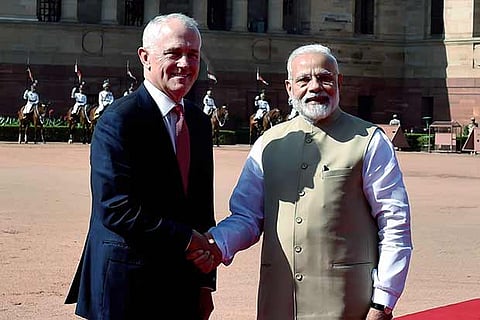

New Delhi
No breakthrough was achieved during talks between Prime Minister Narendra Modi and his Australian counterpart Malcolm Turnbull who merely decided to direct their respective officials to hold an early round of negotiations for a comprehensive economic cooperation agreement (CECA).
During their talks, the two leaders decided to significantly expand their ties in several key areas including defence, trade, energy and education.
While Modi thanked Turnbull for passage of a legislation by the Australian parliament with bi-partisan support paving way for the country to export uranium to India, Turnbull said he was looking forward to starting the supply "as soon as possible".
Both the prime ministers anticipated that commercial exports of Australian uranium could begin soon, opening up a new avenue for Australia to support India's energy requirement.
The entire expanse of bilateral ties was reviewed at the talks including issues relating to Indian students studying in Australia and ways to deepen maritime security in the Indo-Pacific region.
"We took a number of forward-looking decisions to further strengthen our partnership, including the decision to soon hold the next round of negotiations on a CECA," Modi said at a joint media event with Turnbull.
Using cricket analogy, Modi, in a lighter vein, said "I am, of course, glad that our decisions are not subject to the DRS review system." Decision Review System (DRS) is a technology-based mechanism in cricket to review controversial umpiring decisions.
On CECA, Turnbull did not give a timeline for the deal but said, "I think its fair to say that progress has not been as fast as either of us would have liked."
The two prime ministers have now asked negotiators on both sides to find a way out and list their priorities soon so that talks on it can move forward. There were indications that sticking points on the pact included issues relating to agriculture.
On the threat of terrorism, the two leaders asserted that the fight against terrorists, terror organisations and networks should also identify, hold accountable and take strong measures against those who encourage, support and finance terror, provide sanctuary to terrorists and terror groups, and falsely extol their virtues.
"They emphasised the need for urgent measures to counter and prevent the spread of terrorism and violent extremism and radicalisation and expressed their determination to take concrete measures to step up cooperation and coordination among the law enforcement, intelligence and security organisations," a joint statement said.
The MoUs signed provided for deeper cooperation in areas of health and medicine, sports, environment, climate and wildlife, civil aviation security and cooperation in space technology.
Expressing happiness over cooperation in the energy sector, Modi said, "With the passage of a legislation in the Australian parliament with bi-partisan support, Australia is now ready to export uranium to India."
He also thanked Turnbull for Australia's decision to join the International Solar Alliance.
Referring to cooperation in the maritime sphere, Modi said peace and stability in the Indo-Pacific was key for economic growth.
"We, therefore, agree on the need for a secure and rule- based Indo-Pacific. We are also aware that in this globalised world, challenges like terrorism and cyber security extend beyond the boundaries of our region and, therefore, require global strategy and solutions," he said.
Modi said cooperation between the two countries in the area of defence and security has reached new heights.
The two prime ministers highlighted their shared desire to ensure that Indian Ocean architecture keeps pace with regional issues and addresses emerging threats and challenges in the region.
Noting that both the countries have been victims of terrorism, Modi and Turnbull said the signing of the MoU on cooperation in combating international terrorism and transnational organised crime will help both countries to address global and regional security threats.
"Our strong and vibrant strategic partnership is of course important for the security and well-being of our societies. But, it is also a major factor for peace, stability and security in our region," Modi said.
He said student exchanges are an important element of bilateral education cooperation and referred to more than 60,000 Indian students studying in the country.
After ceremonial reception accorded to him at Rashtrapati Bhavan, Turnbull said ties between the two countries "are strong and will be stronger" because of this visit.
Heaping praise on Modi, Turnbull said the Indian PM is leading this most remarkable nation on an extraordinary journey of growth and development.
"The achievements of India are an admiration of the world. We in Australia look forward to working even more closely than we have done in the past.
"We are bound together, ties of history, our values but above all of the peoples. So many people over so many years ? half-a-million Australians are of Indian background," he said.
Visit news.dtnext.in to explore our interactive epaper!
Download the DT Next app for more exciting features!
Click here for iOS
Click here for Android